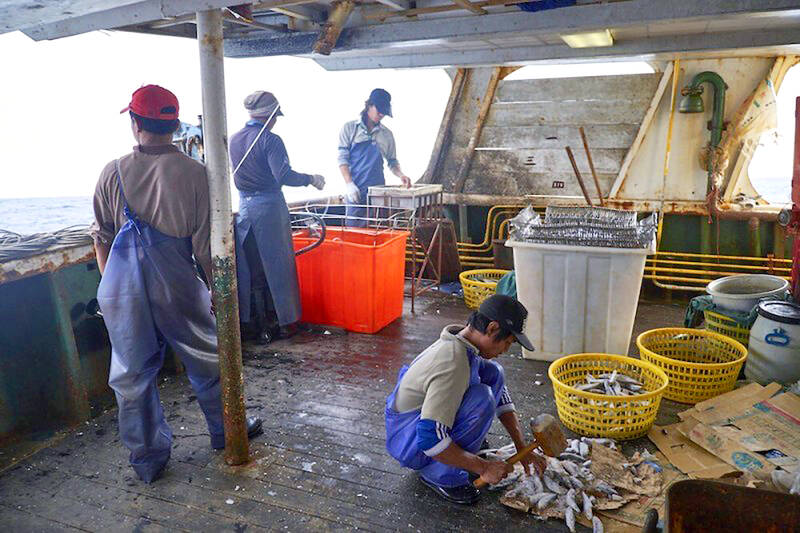The Fisheries Agency yesterday said it has made great strides in improving conditions for foreign fishers over the past two years, after the US Department of Labor on the previous day included Taiwan’s seafood exports on its List of Goods Produced by Child Labor or Forced Labor for the third time.
The agency said that over the past two years, the “Action Plan for Fisheries and Human Rights” has improved the situation for foreign fishers.
The list is a public document put together by the US Bureau of International Labor Affairs to raise public awareness around labor issues and promote efforts to reduce them.

.Photo courtesy of Greenpeace Taiwan
This is the Taiwanese fishing industry’s third inclusion on the list.
The action plan was passed two years ago to improve labor and living conditions for foreign members of fishing crews.
The plan calls for raising the minimum wage, more reasonable working hours and schedules, higher insurance payouts, better ship hygiene and surveillance, and direct payments between employers and their crews, among other reforms.
The agency said it has hired 60 more inspectors and monitors more than half of the offshore vessels in domestic and foreign ports.
In the first half of this year, 98 percent of foreign crew members were paid in accordance with labor laws, the agency said.
In February, the agency hosted US labor department officials to demonstrate how the human rights situation has improved and met with relevant authorities, industry experts and civil groups.
The US officials indicated that Taiwan’s exclusion from the list would require multiple independent sources and objective information, the agency said.
The agency said it would continue to implement the action plan, and called on the industry to improve working conditions, protect the rights of fishers and fulfill their social responsibilities.

Beijing could eventually see a full amphibious invasion of Taiwan as the only "prudent" way to bring about unification, the US Department of Defense said in a newly released annual report to Congress. The Pentagon's "Annual Report to Congress: Military and Security Developments Involving the People's Republic of China 2025," was in many ways similar to last year’s report but reorganized the analysis of the options China has to take over Taiwan. Generally, according to the report, Chinese leaders view the People's Liberation Army's (PLA) capabilities for a Taiwan campaign as improving, but they remain uncertain about its readiness to successfully seize

Taiwan is getting a day off on Christmas for the first time in 25 years. The change comes after opposition parties passed a law earlier this year to add or restore five public holidays, including Constitution Day, which falls on today, Dec. 25. The day marks the 1947 adoption of the constitution of the Republic of China, as the government in Taipei is formally known. Back then the Chinese Nationalist Party (KMT) governed China from Nanjing. When the KMT, now an opposition party in Taiwan, passed the legislation on holidays, it said that they would help “commemorate the history of national development.” That

Taiwan has overtaken South Korea this year in per capita income for the first time in 23 years, IMF data showed. Per capita income is a nation’s GDP divided by the total population, used to compare average wealth levels across countries. Taiwan also beat Japan this year on per capita income, after surpassing it for the first time last year, US magazine Newsweek reported yesterday. Across Asia, Taiwan ranked fourth for per capita income at US$37,827 this year due to sustained economic growth, the report said. In the top three spots were Singapore, Macau and Hong Kong, it said. South

Snow fell on Yushan (Jade Mountain, 玉山) yesterday morning as a continental cold air mass sent temperatures below freezing on Taiwan’s tallest peak, the Central Weather Administration (CWA) said. Snowflakes were seen on Yushan’s north peak from 6:28am to 6:38am, but they did not fully cover the ground and no accumulation was recorded, the CWA said. As of 7:42am, the lowest temperature recorded across Taiwan was minus-5.5°C at Yushan’s Fengkou observatory and minus-4.7°C at the Yushan observatory, CWA data showed. On Hehuanshan (合歡山) in Nantou County, a low of 1.3°C was recorded at 6:39pm, when ice pellets fell at Songsyue Lodge (松雪樓), a